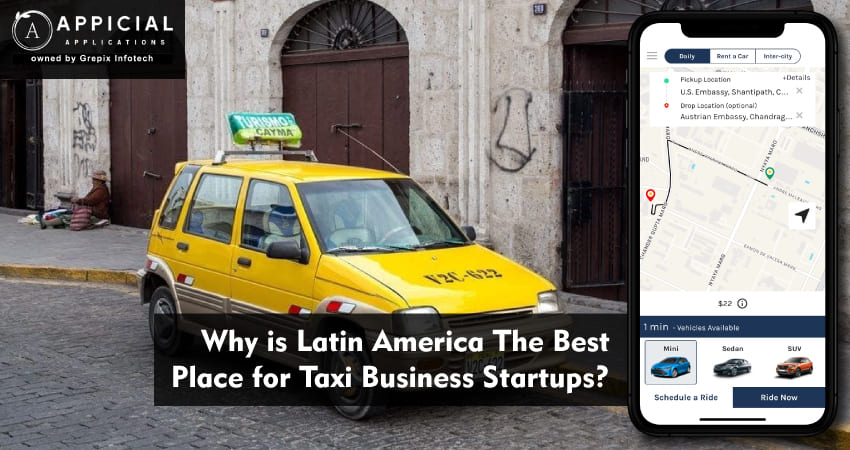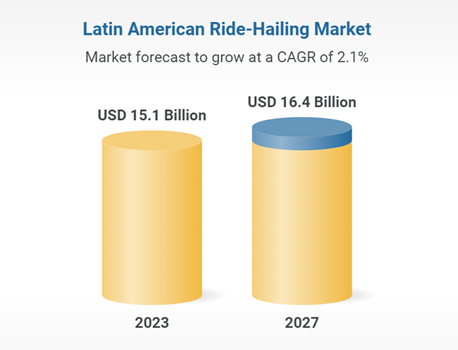
Why Is Latin America the Best Place for Taxi Business Startups
The study reveals that the ride-hailing market in Latin America has achieved a remarkable value of $15.1 billion as of 2023, with forecasts predicting a climb to $16.4 billion by 2027. This upward trend highlights the impact of significant economic factors such as the rapid growth of urban populations, the widespread use of smartphones, and the demand for more efficient transportation solutions tailored to the needs of modern urban living.
Latin America's ride-hailing sector has witnessed unprecedented growth, marking a significant shift in traditional business models towards digital platforms that are transforming the way people navigate city environments. The recent research analysis points out a notable expansion in the market's value and its user base across key Latin American countries, underscoring the industry's evolving landscape and its pivotal role in enhancing urban mobility.
Latin America stands as a prime region for taxi business startups, driven by a booming ride-hailing market projected to reach $16.4 billion by 2027. Factors such as rapid urbanization, high smartphone penetration, and a culture embracing shared mobility create a fertile environment for growth. Key players like Didi Chuxing, Uber, Easy Taxi, and Cabify highlight the competitive yet expansive nature of the market. With technological adoption and supportive regulatory frameworks, the region offers vast opportunities for innovative transportation solutions. Entrepreneurs can capitalize on unserved areas and tech-savvy consumers, positioning Latin America as a hotbed for ride-hailing business success

Prominent Ride-Hailing Companies in Latin America
In Latin America, the ride-hailing industry is vibrant and competitive, with several key players dominating the market. These companies have leveraged technology, local insights, and strategic expansions to capture significant market shares and cater to the diverse needs of passengers across the region. Here are the prominent ride-hailing companies making waves in Latin America:

1.Didi Chuxing
Established in 2012 in Beijing, Didi Chuxing has grown into a major ride-hailing service with a mobile app that pairs customers with nearby drivers. Offering a wide range of services including taxi rides, vehicle hire, chauffeur services, ride-sharing, and minibusses, Didi outpaced Uber in China to become a dominant force in Asia. The company's acquisition of 99 underscores its recognition of Latin America's potential. Currently operational in Mexico and Brazil, Didi is eyeing further expansion into Colombia, Chile, and has recently launched in Panama.

2.Uber
Since launching in Latin America in 2013, Uber has amassed over 36 million active users, finding particular success in Mexico, its second-largest market outside the U.S. Initially enjoying near-monopoly status in Mexico, Uber's dominance has been challenged by Didi's entry into the market. Notably, Uber withdrew from Colombia following regulatory challenges and has faced opposition from local taxi services since its debut.

3.Easy Taxi
Enough coverage for your vehicles, drivers, and passengers is a need. This includes third-party liability insurance, comprehensive auto insurance, and any other coverage that might be necessary for your specific business.

4.Cabify
Originating in Madrid, Spain, Cabify has made significant inroads in Latin America, supported by funding from its parent company, Maxi Mobility. With more than 13 million users and a notable surge in user base and trip completions between 2016 and 2017, Cabify holds a substantial market share in São Paulo, Brazil's largest city, positioning it as a formidable competitor to 99, Uber, and Easy Taxi.
Why create taxi app in Latin America
Latin America, a vibrant and diverse region, has emerged as a fertile ground for entrepreneurial ventures, particularly in the taxi business. This surge in opportunity is not by chance but a result of various factors that make the region uniquely suited for this industry. In this blog, we explore the compelling reasons why Latin America stands out as an ideal location for taxi business startups.
1. Rapid Urbanization
Latin America is undergoing rapid urbanization, with cities expanding at a significant pace. This urban sprawl has led to increased demand for transportation services, as people move further away from city centers yet still need to commute for work, education, and leisure. Taxi businesses are perfectly positioned to meet this growing demand, offering convenient solutions for urban mobility.
Also Read: France's Top Taxi Apps: Revolutionize the Travel Sector
2. Technological Adoption
The region has seen a remarkable increase in technology adoption among its population. With high smartphone penetration rates and improving internet infrastructure, Latin America is ripe for digital taxi platforms that offer ease of use and efficiency. This tech-savvy consumer base is more inclined to use app-based taxi services, providing a ready market for startups.
3. Market Potential
Despite the presence of major players, the Latin American taxi market is far from saturated. Many areas, especially outside major cities, remain underserved. This gap in the market presents a golden opportunity for startups to innovate and cater to the unique needs of different locales, whether through niche services or by enhancing accessibility.
4. Favorable Regulatory Environment
In comparison to other regions, Latin America has shown a more flexible approach to regulating ride-hailing services. While there are challenges, many governments have been open to dialogue and crafting regulations that ensure consumer safety without stifling innovation. This relatively supportive regulatory environment reduces barriers to entry and operation for startups.
5. Cultural Compatibility
Ride-sharing and taxi services align well with the communal and social values prevalent in Latin American culture. The concept of sharing rides or choosing taxis over personal car ownership resonates with the region's emphasis on community and environmental consciousness. Startups that leverage this cultural compatibility in their business model and community engagement can build strong, loyal customer bases.
6. Economic Dynamics
Economic factors, including fluctuations in car ownership costs and public transport deficiencies, have made taxis a more attractive option for many in Latin America. Additionally, the region's economic landscape offers startups cost advantages, such as lower operational and labor costs, making it financially viable to establish and scale a taxi business.
7. Innovation and Competition
The competitive landscape in Latin America encourages innovation. Startups are compelled to differentiate themselves through unique value propositions, whether it's superior customer service, safety features, or pricing strategies. This drive for innovation not only benefits consumers but also propels the entire industry forward.
Conclusion
In conclusion, Latin America emerges as an unparalleled destination for taxi business startups due to its unique blend of rapidly urbanizing cities, tech-savvy population, and a growing demand for efficient transportation solutions. The region's economic growth, combined with its openness to technological adoption and innovation, creates a fertile ground for ride-hailing services.
The technological readiness of Latin America, with its high penetration of smartphones and internet connectivity, further fuels the potential for taxi app development companies. The population's openness to adopting new technologies means that a well-designed, user-friendly taxi app can quickly gain traction, transforming how people move within cities.
Moreover, the regulatory environment in many Latin American countries is evolving to become more supportive of tech-driven business models, including transportation services. This shift presents a strategic window for startups to enter the market, offering compliant and innovative solutions that meet the needs of both customers and drivers. Additionally, the cultural affinity for community and sharing in Latin America aligns well with the shared economy model that many taxi app businesses embody. This cultural trait can facilitate the acceptance and growth of taxi apps that prioritize community engagement and sustainability.
In light of these factors, Latin America does not just offer a market for taxi business startups; it offers a vibrant ecosystem ready to support the growth and success of innovative transportation solutions. As a leading taxi app development company, we are excited about the prospects of contributing to and being part of this transformative journey. Our commitment to leveraging cutting-edge technology, understanding local nuances, and delivering exceptional user experiences positions us uniquely to capitalize on the opportunities in Latin America.





